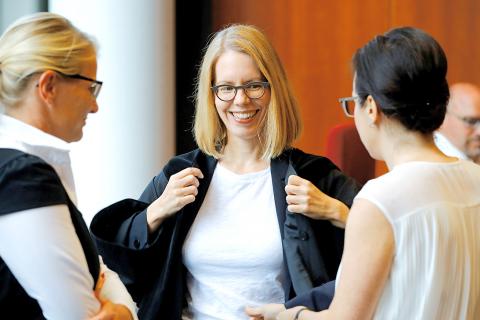Two British former investment bankers yesterday faced a German court in the first criminal trial relating to the “cum-ex” tax fraud scandal, which cost European treasuries billions of euros.
Martin S, 41, and Nicholas D, 38, have been charged on 33 counts of tax evasion and one count of attempted tax evasion, and stand accused of having deprived the state of about 440 million euros (US$485 million) of tax revenues since 2006.
The two men, former employees of UniCredit SpA subsidiary HypoVereinsBank, would be both defendants and key witnesses at the trial in Bonn, Germany, as they look to avoid or reduce a potential prison sentence of up to 10 years by cooperating with the authorities.

Photo: Reuters
Their testimonies in court are expected to shed more light on the complex workings of the so-called cum-ex tax fraud schemes, in which investors reclaimed tax which had never been paid.
First exposed in 2017, the scam involved numerous cooperating participants quickly exchanging stock in companies among themselves around dividend day to claim multiple tax rebates on a single payout.
Used across Europe, the practice cost Germany 7.2 billion euros, Denmark 1.7 billion euros and Belgium 201 million euros since 2001, according to an investigation published in October last year by big-name European outlets including German public broadcaster ARD and French newspaper Le Monde.
In Germany, a change to the tax law in 2012 closed the legal loophole exploited by the practice, although the German Ministry of Finance insists that it was effectively already illegal.
The trial in Bonn is just the tip of the iceberg, as prosecutors in Frankfurt, Cologne and Munich continue to investigate similar cases in the far-reaching scandal.
According to the Frankfurter Allgemeine Zeitung newspaper, about 100 people have been indicted, including bankers, stock traders, lawyers and financial consultants.
Among them is German lawyer Hanno Berger, who has been identified as the mastermind behind the fraudulent scheme and has been awaiting trial since May last year.
The Bonn trial, which is expected to run until January next year with 32 sitting days, would also involve one banking group and four capital management companies.
It is expected to further scrutinize the level of complicity among the financial actors caught up in the cum-ex network, such as the depositary banks responsible for claiming tax rebates on behalf of their clients.
A number of major international banks, including Banco Santander SA and Australian group Macquarie Bank Ltd, have been caught up in the German prosecutors’ investigations.
There have also been raids on Deutsche Bank AG and the German offices of mammoth asset manager BlackRock Inc.
HypoVereinsBank has agreed to repay 113 million euros to German tax authorities and pay a fine of 5 million euros.
Last week, officials also raided securities depository Clearstream, a subsidiary of German stock exchange operator Deutsche Boerse AG.
In May last year, a German court ordered French bank Societe Generale SA to pay 23 million euros of damages to German regional public bank Helaba over fraudulent cum-ex deals.
The French bank is appealing the sentence in civil proceedings expected to open next month.

KEEPING UP: The acquisition of a cleanroom in Taiwan would enable Micron to increase production in a market where demand continues to outpace supply, a Micron official said Micron Technology Inc has signed a letter of intent to buy a fabrication site in Taiwan from Powerchip Semiconductor Manufacturing Corp (力積電) for US$1.8 billion to expand its production of memory chips. Micron would take control of the P5 site in Miaoli County’s Tongluo Township (銅鑼) and plans to ramp up DRAM production in phases after the transaction closes in the second quarter, the company said in a statement on Saturday. The acquisition includes an existing 12 inch fab cleanroom of 27,871m2 and would further position Micron to address growing global demand for memory solutions, the company said. Micron expects the transaction to

Nvidia Corp’s GB300 platform is expected to account for 70 to 80 percent of global artificial intelligence (AI) server rack shipments this year, while adoption of its next-generation Vera Rubin 200 platform is to gradually gain momentum after the third quarter of the year, TrendForce Corp (集邦科技) said. Servers based on Nvidia’s GB300 chips entered mass production last quarter and they are expected to become the mainstay models for Taiwanese server manufacturers this year, Trendforce analyst Frank Kung (龔明德) said in an interview. This year is expected to be a breakout year for AI servers based on a variety of chips, as

Global semiconductor stocks advanced yesterday, as comments by Nvidia Corp chief executive officer Jensen Huang (黃仁勳) at Davos, Switzerland, helped reinforce investor enthusiasm for artificial intelligence (AI). Samsung Electronics Co gained as much as 5 percent to an all-time high, helping drive South Korea’s benchmark KOSPI above 5,000 for the first time. That came after the Philadelphia Semiconductor Index rose more than 3 percent to a fresh record on Wednesday, with a boost from Nvidia. The gains came amid broad risk-on trade after US President Donald Trump withdrew his threat of tariffs on some European nations over backing for Greenland. Huang further

HSBC Bank Taiwan Ltd (匯豐台灣商銀) and the Taiwan High Prosecutors Office recently signed a memorandum of understanding (MOU) to enhance cooperation on the suspicious transaction analysis mechanism. This landmark agreement makes HSBC the first foreign bank in Taiwan to establish such a partnership with the High Prosecutors Office, underscoring its commitment to active anti-fraud initiatives, financial inclusion, and the “Treating Customers Fairly” principle. Through this deep public-private collaboration, both parties aim to co-create a secure financial ecosystem via early warning detection and precise fraud prevention technologies. At the signing ceremony, HSBC Taiwan CEO and head of banking Adam Chen (陳志堅)